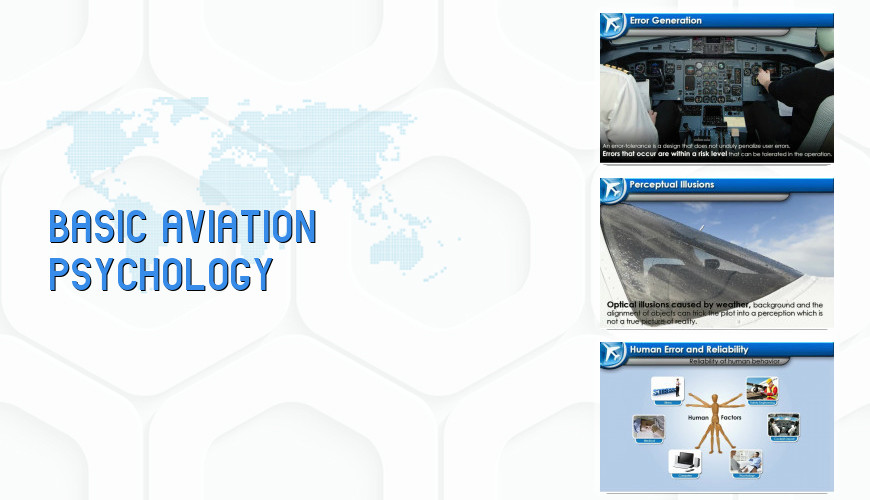
Course Information
This course describes the effects of Human Performance on aviation operations in normal and critical events. This program includes the following information; Human information processing to include, attention/vigil, perception, response/reaction, and different learning methods. Human error and reliability to include, mental models, reliability, situation awareness, human error generation and recognition. Aviation decision making and crew resource management, standard operating procedures and checklist use. Human behavior reviews, personality, behavior, and attitude, human overload actions and the advantages and disadvantages of modern automated cockpits.
Content of the Course
| Slide | 99 | Duration | 01:01:45 | Exam | No |
|---|
- COURSE START
- HUMAN INFORMATION PROCESSING – Attention and Vigilance
- Perception
- Bottom-up and top-down perception
- Perceptual illusions
- Memory
- Workingmemory
- Long-termmemory
- Amnesia
- Response selection – Classical conditioning
- Operant conditioning
- Learning by insight (cognitive approach)
- Imitation
- Skills
- HUMAN ERROR AND RELIABILITY – Reliability of Human Behaviour
- Pra-based techniques
- Cognitive control based techniques
- Mental models and situation awareness
- Theory and model of human error
- Internal and external factors
- Error generation
- DECISION MAKING – Decision-Making Concepts
- AVOIDING AND MANAGING ERRORS: COCKPIT MANAGEMENT – Safety Awareness
- Co-ordination (multi-crew concepts)
- Standard operating procedures (sop)and checklists
- Co-operation – Co-operation, co-action, group
- Status and role
- Communication
- Intra and interpersonal conflict
- HUMAN BEHAVIOUR – Personality, Attitude and Behaviour
- Attitude, personality and behaviour
- Individual differences in personality and motivation
- Self-concept
- Self-discipline
- Identification of hazardous attitudes (error proneness)
- HUMAN OVERLOAD AND UNDERLOAD – Arousal
- Stress – Homeostasis
- Stressor
- General adaptation syndrome
- Stress, arousal and vigilance
- Fatigue and stress management
- ADVANCED COCKPIT AUTOMATION – Advantages and Disadvantages
- Automation complacency
- Working concepts
- COURSE END

